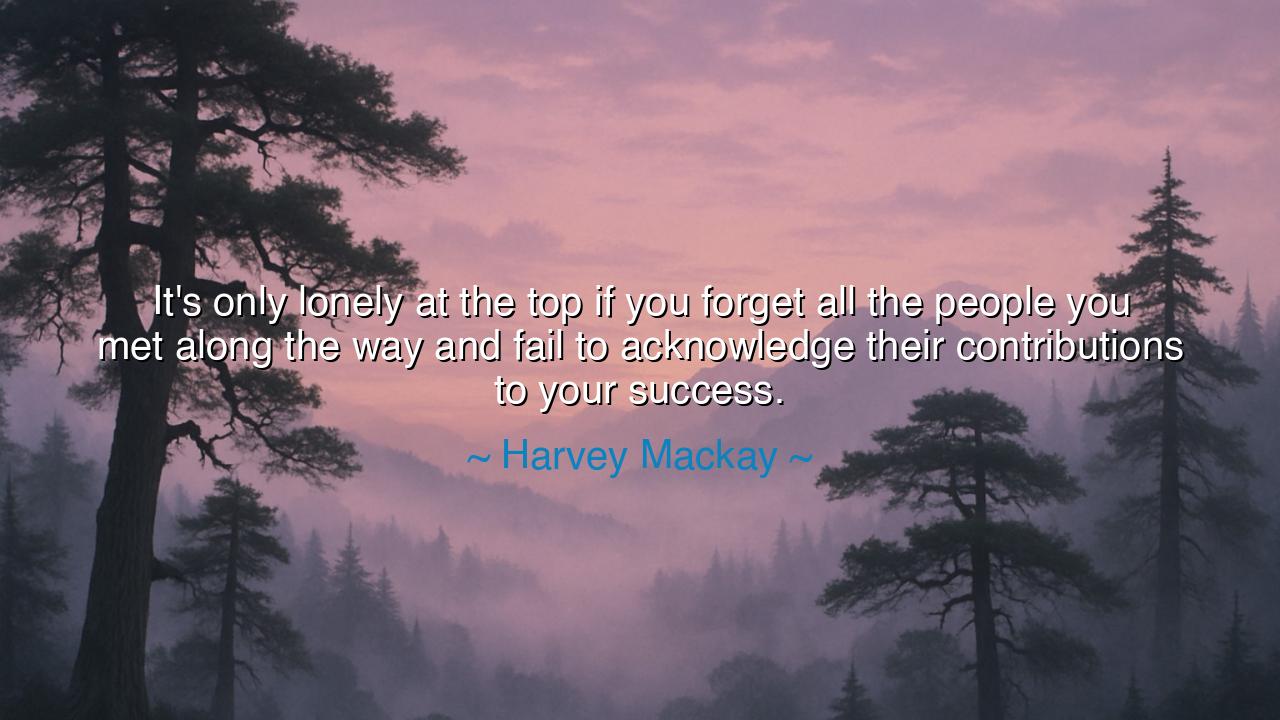
It's only lonely at the top if you forget all the people you met
It's only lonely at the top if you forget all the people you met along the way and fail to acknowledge their contributions to your success.






The words of Harvey Mackay, “It’s only lonely at the top if you forget all the people you met along the way and fail to acknowledge their contributions to your success,” resound with the wisdom of the ages. In them, he reveals a truth that many who ascend the mountain of ambition forget: success is never the labor of one alone. Though a leader may stand upon the peak, his climb was steadied by the hands of many who lifted, guided, and supported him. To forget them is to turn triumph into emptiness, and to find the summit a place not of joy but of loneliness.
The ancients knew this truth well. In the tales of Homer, even Achilles, the greatest of warriors, did not stride into battle without his comrades, the Myrmidons, who bore shield and spear by his side. In Rome, generals celebrated their victories with triumphal processions—but behind the laurels and gold, they knew legions of common soldiers had bled for their glory. Thus, Mackay’s words echo an old teaching: the crown upon a victor’s head is woven from the toil of countless others. To deny this is folly; to acknowledge it is to stand not in loneliness, but in fellowship.
Consider the story of Franklin D. Roosevelt, who rose to lead America through the Great Depression and the storms of world war. Though history crowns him as a figure of towering leadership, his greatness was never his alone. Advisors, allies, and the quiet labor of countless men and women sustained his vision. Roosevelt himself often credited Eleanor, his wife, as his “eyes and ears,” traveling where he could not, hearing the cries of the people, and bringing their truth back to him. By acknowledging her and others, he ensured that his leadership was not solitary. His triumph was shared, and thus his summit was not lonely but filled with companionship and gratitude.
Mackay warns us of a different fate: the one who reaches greatness yet forgets the road and those upon it. Such a person, blinded by pride, sees only their own reflection at the mountaintop. They reap applause but feel no joy, for joy is found not in isolation, but in recognition of shared struggle. Many kings of old fell into this trap. Surrounded by sycophants, they silenced the voices of those who once aided them, until they stood enthroned yet utterly alone—rich in power, but poor in love.
This wisdom carries a vital lesson. Success should not harden the heart, but soften it. Each step we take upward should deepen our gratitude, for the climb is impossible without others. Teachers, mentors, friends, rivals even—all leave their mark upon the journey. To honor them is to remain human at the heights, to keep warmth in the soul when the air grows thin at the summit. The truly great are those who remember, who reach back to lift others, and who share the glory freely.
Therefore, beloved, when you rise—and rise you shall, if you labor faithfully—do not forget the faces of those who walked with you. Speak their names with honor, acknowledge their gifts, and share your triumph with them. In your victories, send gratitude; in your celebrations, make space for others. For then, when you stand at the top, you will not find loneliness, but fellowship, not emptiness, but joy.
Let this be the guiding flame: success without gratitude is isolation; success with remembrance is abundance. Climb boldly, but carry in your heart the memory of those who helped you ascend. In this way, when you reach the heights, you will stand not as one alone, but as part of a chorus of many—and the summit will resound with song, not silence.






AAdministratorAdministrator
Welcome, honored guests. Please leave a comment, we will respond soon